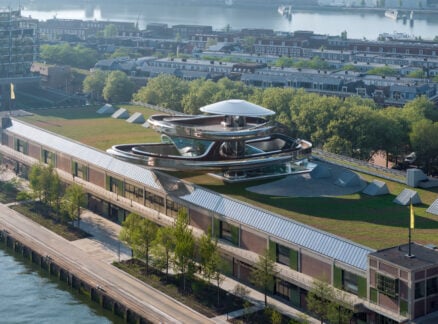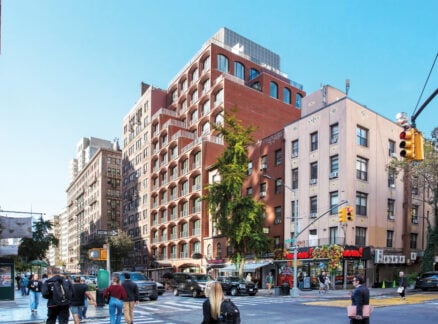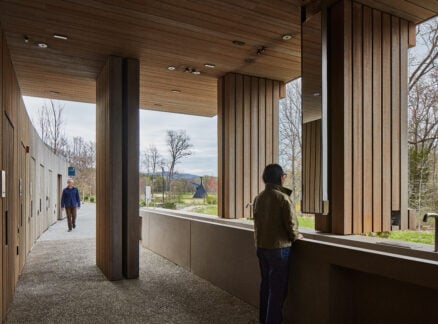January 1, 2003
The Growthing
Science fiction writer Bruce Sterling imagines a future of biomorphic furnishings, emotional sensors, and buildings that support themselves.
Milton’s daughter sobbed aloud as she clutched the chaise longue. “But why can’t I take the chair? I grew it myself from a bean!”
“Gretel, there’s no room for that thing on your flight. Besides, a chaise longue isn’t a ‘chair.’”
Gretel flung herself in anguish on the biomorphic furnishing. In her frenzied teenage grip, the chaise gave a deep pneumatic moan and sentimentally changed color. “But I love my big bubbly sofa! And Mom’s got the stupidest dead furniture in Jersey! My bed at home’s made of wood, Dad! I’m your only daughter! How can you make me sleep on wood?”
Milton checked his wrist monitor. He knew that watching his child’s internal metabolism was a pretty cheap substitute for genuine fathering skills. However, Gretel was 14. Her hormonal storms were pegging the behavior meter. “Gret, you’re hyperventilating. Let’s walk around the Facility one last time before you go. A nice memento for you, that’s just no problemo, okay?”
Profoundly unmollified, Gretel lunged into her walking boots. A month in this Texan desert outpost had been quite the growthful experience for a girl from the megalopolis. She’d swiftly adopted Milton’s mannerisms—his absentminded hacker’s stare, his habit of patting the red bark on the giant biomorphic cisterns. Milton would miss the kid dreadfully. The Facility was a majestic but lonely place, with its veiny dragonfly roofing and storage tanks shaped like swollen sequoias. It had taproots that went down to solid granite. It stored enough clean-power hydrogen to detonate Dubuque. The Facility fed and clothed Milton. It also lit itself, warmed itself, harnessed solar and wind power, and recycled every nutrient. The building had a baroque attention to design detail that rivaled Cinderella’s midnight pumpkin. Still, it was basically a Texan energy refinery. Not quite the place for a gala soiree.
Every deer and javelina season the Facility booked in some drunken hunters. Then the kitchen appliances would perk up and the food would taste more like real food. Most days, though, stuck on his patrol inside this high-biotech marvel, Milton was a lighthouse keeper. Just him, the Marooned Genius on the Forbidden Planet, and the maintenance software.
Gretel never seemed lonely. She liked her teenage friends much better when they were stuck behind computer gaming screens. Gretel had a definite Mad Scientists’ Beautiful Daughter riff. Stuck in some fashion spasm that was either total vanity or total despair (most likely both), she had been wearing the same dress every day. Each morning a fresh one emerged from a wall in a sheet from a slot, as dainty as Kleenex. Dirty clothes vanished down the composting toilets. The fashion choices available on the Facility’s system were franchised direct from Milan and bounced in by Chinese satellite. But the sheer labor of those endless choices had bored or paralyzed Gretel. She was finally figuring out that mass-customized home manufacturing was way too much like work.
Occupation sensors popped to watchful life as the two of them left the manager’s quarters. Milton spent most of his working days inside the Facility’s office: the place was all skeins, screens, and thick paper panes, a little mossy and gooey here and there, but with a nice origami feel to it—very crisp, shoji, Shinto. They walked under the cabbagelike pergola, the dry, blistered floor popping like Bubblepak under their boot heels. Gummy zippers opened here and there in thick barky walls. Thoughtful gasps of flavored mist kept them cool in the insufferable Texan air.
“I’ll miss this big wonderful place, Dad!”
“I’m glad you had a chance to witness some modern industry, honey. Someday the weird construction techniques they demo out here in the desert will become contemporary urban policy. Yes, even in pokey old New York. By the time you grow up to be my age, I’m sure you’ll hate everything else.”
“I’m ahead of the curve, Dad. I already hate everything else.”
Life within the Facility had definite benefits, especially considering the alternatives posed to Milton by the special prosecutor. Against his better judgment—well, mostly—Milton had been sucked into a massive city hall scandal involving phony revenue from automated traffic tickets. He’d made an unusual plea bargain, but any engineer who could manage the daily traffic flow across the Brooklyn Bridge had no problem administering a giant Texas fuel turnip. Once he’d done his time growing and pruning this place, Milton had plans to input some fresh biological juice into the Big Apple.
Some precious day he would return to his beloved Manhattan apartment. The place was sublet to a kindly magazine editor, a gentle civilized soul who worked 80-hour weeks, surviving mostly on cold shrimp chow mein. Come Christmas 2045—or spring 2046 at the latest—he’d be cozying up again with his favorite classic Rashid blobjects. The top-end decor had been an endless source of friction with his ex-wife, who had no taste. The very thought of his own flesh and blood forced to live on Sears veneer colonials in some featureless brick condo in Jersey—man, that really stung.
Milton and his daughter walked together under the translucent arch of a giant veiny breezeway, grown in place to funnel the prevailing wind. West Texas was the Saudi Arabia of American native wind power. Unfortunately nobody lived in West Texas any more because the aquifers were depleted and there was no drinkable water left. Yet somebody still had to mind the store. “Honey, you remember what you’re supposed to tell Mom about those offshore accounts I kept?”
“Sure thing, Dad. Ooh look! A big solar barnacle! Can I take that home?”
“They die if you peel them loose, precious. They’re kind of parasitic.”
“How about some barnacle seeds, then? This one’s flowering.”
“They wouldn’t do all that great in the New Jersey climate.”
Gretel’s face clouded in frustration. “Dad, just squeeze their stupid genetics till they can do New Jersey!”
“Well sure, if I broke copyright and hacked their gattaca, but…” Milton stopped. He was talking to a 14-year-old here. “You can have a solar barnacle, sweetie. Just send me e-mail as soon as you get home.”
Fresh liquid reeking of praline, pepper sauce, and chocolate molé came from the double row of giant mushrooms outside the gate. Their vast waxy undersides bulged with captured rainwater from the last greenhouse monsoon. As a value-added fillip they fermented Tex-Mex flavoring agents within their giant bioactive cups. Twice a year guys from San Antonio came by in tanker trucks.
Gretel began to sniffle and wipe her eyes, in a rampant mix of sentiment and pepper sauce. “I’ll miss this big growthing so much, Dad. The subterranean heat pipes, the hydrogenic bacteria. Those kids at Christie Whitman High just don’t get this.”
“I gotta admit, when Monsanto went into architecture, they really did it up brown. They’ve got it going on with that enigmatic spatial fluidity.” It broke his heart when she stood there bravely on the Facility’s windblown rubber launchpad, tethered to a kite and clutching her overstuffed pack. The passing zeppelin snagged her with a wire retrieval. Gretel shot into the sapphire Texas sky as if packed in a mime’s invisible elevator. Goodbye, till the next time he got custody. Milton pulled off his thick black glasses and rubbed both hands all over his close-cropped hair and beard. My God, reproduction is such a fantastic, terrifying business.
A week later another teenage girl showed up. She had tried to sneak up the Facility’s drainpipes until stopped by the whooping intrusion alarms. She was thin, sunburned, covered in windblown dirt, and wore fringed buckskin leather and feathers. “You’d better let me go,” the girl advised Milton solemnly. “My dad’s a desert war veteran. He’s a SEAL. He’s a Green Beret and Delta Force. He’s got like lasers and daisy-cutters and stuff.”
“What’s your name, Kid?”
“It’s Janis. We’re like Comanches. We’ve got tattoos. We’re really scary and heavy. I’ve got an unmanned spy plane and a bazooka.”
“So, you must be a native Texan, am I right?”
“Yeah, we-all are from Lubbock! Except there’s no water left under the ground. So now we just live inside our pickup trucks. My dad’s got a Howitzer and land mines, Mister. He could blow this whole place up just like that.” Janis snapped her fingers.
“Look Janis, this is a green renewable fuel-storage facility. We could blow this place up so hard that Taiwan would ring like a gong. But so what? There’s nobody for miles around here but you, me, and our fellow enviro-disaster derelicts.”
Janis’s eyes darted from side to side. Then she faked a shrug. “Well, I got e-mail from New Jersey saying there was all kinds of fantastic cool stuff inside this place. And boy, is there ever! It’s like the Emerald City of Cabbage! And my tribe really needs water. Do you have, like, Perrier?”
“Does your dad ask for that? He sounds kind of picky.”
“No, Abdullah says that. Abdullah’s from Morocco. He’s our appropriate technology advisor from the UN. Abdullah’s teaching us how to make valuable trade goods from sheep.” Janis brightened. “‘Cause sheep have this kind of cool hair that just grows on them! Like a Chia Pet! You can cut it off and weave it into stuff! It’s great! You can even make tents!”
“Yeah, that sounds real advanced and bio-organic.”
“Oh yes, it so much is! But, you know, if you have sheep you have to water them.”
Milton rubbed his chin. “So, uh, how many consumers are there in this big marauding desert tribe of yours?”
“About five hundred! Okay, three hundred. Two hundred. A hundred and eighty-eight.”
“Are you guys in the market for cool furniture? Welcome to the future, Kid. How would you like to live here?”





